Stay in the know on all smart updates of your favorite topics.
Samen naar een warmtesysteem

Het Servicepunt Duurzame Energie organiseert in samenwerking met Amsterdam Smart City twee kennissessies over lage- en middentemperatuur warmtesystemen. Op 5 oktober gaan we van start met een kick-off en op 26 oktober zullen we verder we verder de diepte ingaan.
Tijdens deze sessies zullen we ingaan op verschillende vraagstukken. Hoe realiseer je zo’n warmtesysteem? Welke verschillende strategieën kunnen gevolgd worden? En hoe betrek je de omgeving? We gaan dieper in op wat lage- en middentemperatuur warmtesystemen precies inhouden. Daarnaast komen verschillende ervaringsdeskundigen aan het woord. Waar liepen zij tegenaan en hoe losten ze dit op? Na het volgen van deze kennissessies heeft u de tools in handen om zelf aan de slag te gaan.
Loop je als gemeente, kennisinstelling of als publieke organisatie rond met bovenstaande vragen? Meld je dan alvast aan via deze link.
PROGRAMMA:
De eerste bijeenkomst start met een praktijkvoorbeeld van de gemeente
Nijmegen. Pieternel Blankenstein neemt ons mee in het proces dat zij hebben
doorlopen in hun tweede proeftuin. Voor welke uitdagingen kwamen zij te staan
en hoe zijn zij dit aan het oplossen? Daarna komt Martijn van Lier van bureau
Over Morgen aan het woord die meer uitleg geeft over lage- en middentemperatuur
warmtesystemen. Past het wel binnen uw gemeente en wat moet er allemaal
georganiseerd worden? Met de nieuw opgedane kennis gaat u onder begeleiding van
een expert zelf aan de slag met het maken van een stappenplan.
13.30 - 14.00: inloop met koffie en thee
14.00 – 14.10: kick-off
14.10 – 14.25: jullie uitdagingen
14.25 – 14.50: voorbeeld uit de praktijk door Pieternel Blankenstein van
gemeente Nijmegen
14.50 – 15.25: ‘college’ door Martijn van Lier van Over Morgen
15.25 – 15.30: korte pauze
15.30 – 16.05: zelf aan de slag
16.05 – 16.35: feedback van expert
16.35 – 16.50: pitch
16.50 – 17.00: afsluiting
De bijeenkomst zal fysiek gehost worden in Haarlem.
Energy Tech x The Netherlands: Launch Event

Launching ETM Amsterdam, an accessible event series focusing on exploring the energy transition.
About
Ready to throw yourself into all things energy transition? We’re kicking off the Dutch chapter of the global Energy Tech Meetup movement.
ETM is the global community for energy innovation. Starting out in Tokyo, Energy Tech Meetup events have been bringing together startups, professionals, academics, investors, and students since the start of 2019. And now ETM is coming to the Netherlands and we want anyone and everyone who’s got energy on the 🧠 to be a part of our community.
In partnership with leading energy VC SET Ventures, we’re starting off our series with a special event on what’s shaking up the Dutch energy landscape. You’ll get fresh and varied insights from innovation departments, research gurus, and cutting-edge startups.
Sound good? Then come join our first event in Zoku, Amsterdam – you can exchange ideas, find new opportunities in energy or simply mingle over a beer.
And keep up to date on what's happening over on Instagram and LinkedIn 👀
Launch event
The Dutch energy sector is booming and we’re giving the floor to those who are right in the thick of it. You'll get the inside scoop on all things energy transition during our launch event from Energyworx, Gradyent, E-Flux BV, Eneco, SET Ventures, and more.
Here’s what to expect:
7:00pm - 8:00pm: We'll have guest speakers giving a broad perspective of innovation in the Netherlands. With a startup, corporate and academic view, we’ll discover where we should be sitting up and taking notice within the energy transition.
8:15pm - 9:00pm: Those on the ground building cutting-edge startups, will be telling us about the sectors that are core to the Dutch energy transition.
Location – Zoku
We’re over the 🌕 to link up with Zoku for our first event – a trendy, home-office hybrid, Zoku is all about building a community around sustainability, solidifying their commitment with attaining a B Corp certification back in 2018.
Tickets
ETM is run by volunteers and is a nonprofit, so we won’t be pocketing any of the dosh. The €5* gets you a free drink on arrival, so in the words of Wham...‘Club Tropicana, drinks are free. Fun and sunshine**, there's enough for everyone’.
*the tickets are non-refundable
**can’t guarantee sunshine, but yes to the free🍹
Startups: Between the Curse of Becoming a Taker and the Prospect of Being a Maker

For centuries, entrepreneurship was linked to art and craft and rewarded by personal fulfilment, satisfied customers, and a good life. The term entrepreneur is still associated with giving direction, shape and content to new activities based on personal motivation and skills and thereby creating socially approved value. A description that applies to the self-employed, business entrepreneurs, franchisees or intrapreneurs and includes both commercial, institutional, and artistic activities.
However, there are two problems. Overcoming them opens the way to become a better business.
The plunder of the earth
Nobel laureate Joseph Stiglitz has warned that the creative power of entrepreneurship can easily become destructive. A 'maker' becomes a 'taker' once creating value becomes making money in the first place. Indeed, for centuries, companies have robbed resources around the world, destroyed nature, traded millions of slaves and exploited domestic workers, creating the divide between rich and poor countries.
The creative power of entrepreneurship can also be aimed at sustainable prosperity, for their employees, the country, and the world. In that case, the “purpose” of a company precedes the pursuit of profit. Unfortunately, still a minority of all companies are moving in this direction while others pretending.
The decline of engagement and passion within the workforce
There is more. In developed countries, the blatant exploitation of labour has disappeared. Instead, the majority of employment relegates into low strain jobs. Research by Gallup and Deloite has shown over consecutive years that over 64% of all employees worldwide are not engaged or passionate. Find John Hagel explain this in a short video. The reason is clear. 20th century companies have organized their production according to principles of scalable efficiency and have top-down planning and control. Room for initiative is therefore neither expected nor desired. Moreover, detailed protocols and regulations limit employment for people at a distance from the labour market.
In a rapidly changing world, companies must be adaptive and innovative. They therefore need flexible, interdisciplinary teams with a high degree of self-government and less pay differentials. According to recent research in 17 countries, this type of organizations (8%) outperforms in all respects.
Summarizing, to become a better business requires a double challenge:
· Replacing the dominance of the pursuit of money with a social and environmental purpose.
· Mobilizing the entrepreneurial and other capacities of their whole work force by forms of self-organization and shared leadership.
Why focussing on startups?
As only a limited number of companies meet these conditions, employees consider starting their own business. In the US alone, approximately two million workers give up well-paying jobs every year and become self-employed. 127,000 starters were registered in the Netherlands in 2018. Of them, only a minority will become a startup, which means that they will successfully commercialize a promising technological innovation and grow rapidly on an international level.
Start-ups are potential engines of growth and innovation. In the US, their steady growth is compensating for job losses in the rest of the economy. Dutch startups created 20.000 of jobs in 2018 and 2019. A recent reportoffers excellent documentation of the identity, growth and potential of the 4,311 Dutch startups in 2019, most of which have fewer than 10 employees. 34% of Dutch startups can found in the Amsterdam metropolitan area.
The hope is that start-ups will rise to both challenges by nurturing their social and environmental purpose end fueling the commitment and passion of each employee, and thereby become a better business.
Yet, like any other businesses, startups risk becoming takers rather than makers, trading their social and environmental purpose for the pursuit of money and losing the engagement and passion of their employees. Fortunately, they can prevent this.
Eleven ways to become or stay a better business
1. Embrace self-organization and shared leadership.
2. Involve all employees in the continuous strengthening of the social and environmental purpose of the company.
3. Enable all employees to become shareholders or even better co-owners.
4. Cherish diversity within the employees.
5. Secure shares in a foundation while enabling shareholders to support the purpose of the company.
6. Cap the profit to a level that guarantees the continuity of the company.
7. Ban greed, cancel bonuses, or at most pay a limited and equal allowance to all employees.
8. Place surplus profits in a foundation that spends money in accordance with the purpose of the company.
9. Being a fair taxpayer who refrains from tax avoidance practices.
10.Create a supervisory board to monitor the purpose of the company.
11.Focus the founder/director/CEO role on monitoring the purpose of the company and the commitment of all employees and on fueling the discussion on how to deal with changing external conditions.
Rapid societal changes require a reinventing the concept of entrepreneurship. Because of their flexibility and commitment, startups are apt to embrace the dual ambition of pursuing a social and environmental purpose and of mobilizing all employee’s engagement and passion.
My next post will look at how cities can help start-ups to settle, grow and become better businesses. The history of entrepreneurship, its growing distance from ‘makership’ and its possible revival by start-ups is documented in chapter 4 of my e-book Humane cities. Always humane. Smart if helpful. The English version of this book can be downloaded for free below.
Vacature: Samen impact maken op transities in de leefomgeving

Als SMC| Strategie en Management Consultants van Royal HaskoningDHV zijn we op zoek naar mensen die 'samen' impact willen maken op de transities in onze leefomgeving. Niet omdat ze weten hoe het moet, maar omdat ze anderen kunnen begeleiden in hoe het kan! 'Gedeeld Eigenaarschap' noemen we dat in onze visie op samen werken aan maatschappelijke veranderopgaven.
Voor de volgende vacatures na de zomervakantie komen we graag nu al met je in contact:
→ Proces- en programmamanager nationale en regionale energiestrategieen en PPS (circa 10 jaar ervaring);
→ Senior-Consultant Bestuur, Programma’s en Organisatie (circa 10 à 15 jaar ervaring)
→ Proces-professionals Klimaat, Energie, Ruimte, Mobiliteit en Landbouw (circa 2 à 7 jaar ervaring).
Voor een eerste 'teen in het water', bel of mail al gerust met pascal.lamberigts@rhdhv.com / 06 – 22 37 86 65. Dan passen we onze vacatures graag aan op jouw kwaliteiten en meerwaarde.
→ Voor een kijkje in de keuken bij ministeries, provincies, gemeenten, waterschappen en - steeds meer - ook bedrijven;
→ Voor strategisch mensenwerk in de voorfase van nieuwe ontwikkelingen, met 6.500 collega's als inhoudelijke sparringpartners in een groot, internationaal bedrijf;
→ Voor samenwerken in een cultuur gebaseerd op de principes van de netwerkorganisatie – veel vrijheid, veel verantwoordelijkheid;
→ Voor een eigen SMC Academy gericht op samen leren en ontwikkelen in proces- en programmamanagement en organisatieontwikkeling;
→ Voor de snelste leercurve in opgavegericht werken voor young professionals als springplank naar een volgende uitdagende baan bij ministeries, provincies en grote gemeenten.
DRIFT and Amsterdam Smart City find each other in partnership
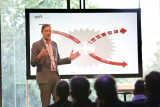
Research institute DRIFT, the Amsterdam Economic Board and Amsterdam Smart City have been working together for some time now. So it only seemed logical to make this union structural.
DRIFT develops and shares transition knowledge with innovative methods and academic training sessions and gets involved in the public debate. ‘Both at DRIFT and within the network of Amsterdam Smart City, we see opportunities and the necessity to change towards a sustainable society. We are happy to enrich this network with our specific knowledge and experience. But also to learn how to shape these kind of new collaborations. The open, learning approach really appeals to us,’ says Gijs Diercks, senior researcher and advisor at DRIFT.
Leonie van de Beuken: 'We are very happy that DRIFT is structurally committed to the Amsterdam Smart City network. We share a passion for empowering others to actively engage in transitions. From residents to entrepreneurs to governments. This way we can achieve tangible results. The knowledge and experience that DRIFT brings in this area is a wonderful addition to our network.'
Wicked Problems; the underlying barriers within transitions
For some time DRIFT has already been part of the team with partners that is developing an approach to tackle so-called 'wicked problems' better together. An approach aimed at revealing and breaking down underlying barriers within transitions. We use new methods for this and connect what we encounter in the implementation with the strategic level.
Picture credit: Edwin Weers
3rd Intelligent Cities Challenge City Lab: Green Initiatives

During the 3rd ICC Lab, this session will bring together city relevant European Commission initiatives promoting the green agenda, with a view to depict the bigger picture, present their objectives, how they contribute to advance the EU policy priorities, show complementarities and discuss cross-fertilization among them.
Registration is possible via: https://www.intelligentcitieschallenge.eu/events/3rd-icc-city-lab
12:00 - 13:00 Tech4Good Marketplace
The Tech4Good Marketplace is an exchange of technology-powered solutions and business models designed to advance social, environmental and economic causes. Showcasing operational services from innovative European SMEs, start-ups and enterprises, the marketplace is a space where cities, regions and rural areas, businesses, technology entrepreneurs, social economy actors and civil society can get inspired and find solutions to the challenges they face. Join this session to find out why this marketplace is here to stay and why you should sign up, too.
- Anna Athanasopoulou, Head of Unit Proximity, Social Economy and Creative Industries, DG GROW, European Commission
- Iordana Eleftheriadou, Head of Cities and Proximity Team, DG GROW, European Commission
- Davor Meersman, OASC
13:00 - 14:00 Break
14:00 – 15:30 Initiatives at European Level on the Green Transition of Cities – Panel Discussion
Bringing together city-relevant European Commission initiatives promoting the green agenda, with a view to depict the bigger picture, present their objectives, how they contribute to advance the EU policy priorities, show complementarities and discuss cross-fertilization among them.
- Anna Athanasopoulou, Head of Unit Proximity, Social Economy and Creative Industries, DG GROW, European Commission
- Marek Teplansky, Head of Unit, Inclusive Growth, Urban and Territorial Development, DG REGIO, European Commission
- Philippe Froissard, Head of Unit, Future Urban & Mobility Systems, DG RTD, European Commission
- Eddy Hartog, Head of Unit, Technologies for Smart Communities, DG CNECT, European Commission
- Xavier Troussard, Head of Unit, New European Bauhaus, JRC, European Commission
- Helen Mccarthy-O’ Kelly, Policy officer, Environmental Knowledge, Eco-Innovation & SMEs, DG ENV, European Commission
- Luana Maria Bidasca, Policy officer, Innovation & Research, DG MOVE, European Commission
3rd Intelligent Cities Challenge Lab Public Event

During the EU Green Week, the 3rd Intelligent Cities Challenge (ICC) City Lab will bring together global thinker urban development experts and city leaders across the globe to issues climate-neutral and socially responsible industrial future.
The event is open to the public and registration is possible via: https://www.intelligentcitieschallenge.eu/events/3rd-icc-city-lab
Program
11:30 – 13:00 Public session 1 – Zero pollution city: Leading the green transition of local businesses
- Anna Athanasopoulou, Head of Unit Proximity, Social Economy and Creative Industries, DG GROW, European Commission
- Tadashi Matsumoto, Head of the Sustainable Development & Global Relations Unit, OECD
- Michael Koh, Executive Fellow, Centre for Liveable Cities - City of Singapore, clean and green environment
- Victor Dimoulis, Scientific Advisor to the Mayor on Waste management and Circular Economy affairs - City of Corfu, industrial waste management
- Geertje Pronk, Researcher and Programme manager at KWR Water Research Institute - City of Mechelen, water management
- Rosa Väisänen, Specialist, City of Espoo, Sustainable Urban Development
ICC Cities’ experts to present initiatives on zero pollution:
- Sharing reflections and work done to overcome pollution at city-level
- Inspire others with ideas on how digital tools can be used to prevent intense pollution, monitor status, or warn citizens of high levels of pollution
- Provide insights into key lessons learned
13:00 – 13:30 Break
13:30 – 15:00 Public session 2 – City of the future: New urban trends for a climate-neutral and socially responsible industrial future
- Dana Eleftheriadou, Head of Cities and Proximity Team, DG GROW, European Commission
- Valentina Superti, Director of Proximity and Tourism, DG GROW, European Commission
- Jan Olbrycht, President of the URBAN Intergroup, European Parliament
- Carlo Ratti, Director, MIT Senseable City Laboratory – ICC advisory board member
- Gesa Ziemer, Head of CityScienceLab, UNITAC Innovation Technology Accelerator Centre, Hamburg – ICC mentor city
- Michela Magas, Chair, Industry Commons Foundation
- Nicolás Rivillas Hincapié, Deputy Manager of Design and Innovation, Urban Development Company (EDU) of Medellín - ICC mentor city
- Daniel Gonzalez-Bootello, Director of Smart City Cluster - ICC advisory board member
Bringing together global thinkers, urban development experts, city leaders from across the globe to showcase how intelligent cities will lead the way to a sustainable, productive, zero-pollution future:
- What will the urban future look like after the Covid-19? How can cities prepare?
- How can cities reconcile population growth and local industrial production with the European Green Deal?
- What can city leaders do to ensure a new City model that is sustainable, resilient, socially just and knowledge intensive?
Subsidies voor duurzaam economisch herstel in tijden van Corona
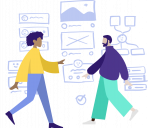
De Amsterdamse economie is zwaar getroffen door de coronacrisis. Daarom heeft gemeente Amsterdam extra geld beschikbaar gesteld om de economie juist in deze moeilijke tijden aan te jagen.
De subsidies zijn bedoeld om vernieuwing en werkgelegenheid in onderstaande sectoren te realiseren:
• circulaire economie
• energietransitie
• schone en slimme mobiliteit
• digitaliseren
• gezondheid
De steun zal in de vorm zijn van twee subsidies. Hieronder lees je meer over de subsidies.
Subsidie om een projectvoorstel te schrijven
Amsterdam stelt extra geld beschikbaar voor ondernemers die bijdragen aan duurzaam economisch herstel in tijden van corona. Heb je een idee dat niet van de grond komt tijdens de coronacrisis? Ontvang tot 25.000 euro om een projectvoorstel van tenminste 2 miljoen te ontwikkelen voor een Nationaal of Europees coronaherstel- of stimuleringsfonds.
Kijk op de website om te zien of jij in aanmerking komt voor de subsidie of om je direct in te schrijven.
Subsidie om een project te realiseren
Amsterdam stelt extra geld beschikbaar voor ondernemers die bijdragen aan duurzaam economisch herstel in tijden van corona. Heb je een project dat niet van de grond komt tijdens de coronacrisis? Krijg 100.000 tot 500.000 euro subsidie om jouw project te realiseren.
Zie de website om te kijken of jij in aanmerking komt voor de subsidie of om je direct in te schrijven.
11 building blocks for the transition to sustainable energy

In five consecutive blog posts, I have explored the opportunities and risks in the energy transition of carbon capturing and storage (CCS), biomass, geothermal energy, hydrogen, and nuclear energy, in addition to solar and wind. Find my conclusions below:
1. Sun and wind energy
I will feel most comfortable in a world deploying energy provided by sun and wind to reduce greenhouse gas emissions. This implies a huge transition, which, also brings significant benefits for an emerging sustainable economy.
2. Nuclear energy plants
Instead of opting for an expensive third-generation nuclear power plants, we better invest in the development of fourth generation nuclear energy plants, such as Thorium, or molten salt reactors. Their waste is limited, and they are inherently safe. These reactors could potentially replace outdated wind turbines and solar panels from 2040.
3. Using less
We must also continue using less energy, without undue expectations. After all, clean energy can potentially be abundantly available in the long term, although this is particularly relevant for developing countries.
4. Hydrogen energy
In addition to the use of solar and wind energy, I am opting for hydrogen. It will be used for heavy industry, to level discrepancies in the supply and demand of energy and as an additional provision for heating buildings and houses. The presence of a high-quality gas network is easing this choice. In addition, we use residual heat, biomass of reliable origin and we exploit geothermal energy where its long-term availability is assured.
5. Energy from the desert
By no means we are producing all necessary hydrogen gas ourselves. The expectation is realistic that after 2030 it will be produced in deserts and transported from there at a competitive price.
6. Wind turbines and solar panels
The North Sea and the IJsselmeer will become the most important places for the extraction of wind energy. Besides, solar panels are installed on roofs wherever possible. We care for our landscape and therefore critically consider places where ground-based solar panels can be installed and where wind turbines are not disturbing. Part of the wind energy is converted into hydrogen on site.
7. Capture and store CO2
It could easily last until 2040 before the import and production of hydrogen meets our needs. Therefore, we must continue to use (imported) gas for quite some time. To prevent greenhouse gas emission, significant capacity to capture and store CO2 must be in place.
8. Gas and coal
Given the availability of temporary underground storage of CO2, premature shutting down our super-efficient gas and coal-fired power stations it is unnecessary capital destruction. They can remain in operation until the facilities for solar and wind energy generation are at the desired level and sufficient hydrogen gas is available.
9. Local energy
Energy co-operations facilitate the local use of locally produced energy, thus enabling lower prices, and limiting the expansion of the electricity grid. To this end, private and neighborhood storage of electricity is provided.
10. Biomass
Reliably collected biomass is deployed as raw material for the biochemical industry in the first place and can further be used for additional fueling of coal and gas-powered stations (with CO2 capture) and as local energy source for medium temperature district heating networks.
11. Take some time
Finally, we must take enough time to choose the best way to heat buildings and houses at neighborhood level. Getting off gas prematurely can induce wrong choices in the longer term. A gradual phasing out of gas heating will enable us to wait longer for the moment when hydrogen (gas) is available to replace the natural gas in neighborhoods where it is the best solution.
Ontdek wat participatie in energietransitie inhoudt met online spel
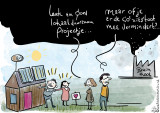
Op 4 juni organiseert Hogeschool van Amsterdam een online spelsessie waar participatie in de energietransitie centraal staat. Tijdens deze sessie krijg jij de kans om in de rol te kruipen van een betrokkene in de fictieve stad Vechtdrecht en zo te ontdekken wat participatie voor iedereen inhoudt.
Wat gaan we doen?
- De sessie start met een korte presentatie over vraagstukken rond participatie in de energietransitie met name op het niveau van wijken en buurten.
- Daarna spelen we het spel Participatie in de Energietransitie, waarbij je in de rol kruipt van een betrokkene uit Vechtdrecht zoals een wethouder, buurtbewoner, energieadviseur, investeerder, of een mederwerker van een woningcorporatie of energiebedrijf.
- Samen ontdek je wat participatie voor ieder van jullie inhoudt, welke voorwaarden van belang zijn en hoe die gerealiseerd kunnen worden. Blijven de meningen verdeeld of lukt het consensus te bereiken over wat participatie in de energietransitie moet en kan betekenen?
- De sessie sluit af met een reflectie op het spel en een uitwisseling van ideeën over verdere ontwikkeling van het spel voor het onderwijs en om discussie op gang te brengen over participatie in de praktijk van de energietransitie.
Wanneer: vrijdag 4 juni
Hoe laat: van 9.00 tot 11.00
Waar: online
Meedoen? Meld je uiterlijk maandag 31 mei aan bij Melika Levelt: m.levelt@hva.nl
Je ontvangt een bevestiging van deelname als er nog plek is. Reken ook op voorbereidende informatie over Vechtdrecht en je rol zodat we op vrijdag 4 juni vol overtuiging met elkaar in gesprek kunnen.
Help! My grid is congested

We proudly invite you to the EV Energy Final Conference happening on 12 May 2021 from 9:30 am - 11:30 am online.
Over four years of project implementation. It's been a long and exciting journey for all of us. Along the way we have been able to share our experience, learn from each other and implement successful practices in our regions.
Our final conference presents how practical experiences and regional policy incentives were shared and led to new insights, policy recommendations and running action.
Cities and regions are on the path towards clean mobility, made possible by local renewable energy. We present 5 EU-cities and regions (Amsterdam, Barcelona, Kaunas, Rome and Stockholm), which have been actively collaborating in transition efforts, sharing learnings from policy making, planning and implementation. Although the stages of development vary between these cities, this collaboration has been very fruitful and inspirational.
The event is dedicated to policy makers, project teams, CPO’s, energy companies and local initiatives aimed at adopting renewable energy as a pillar in their future actions.
Meet the five stepdaughters of the energy transition
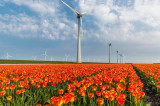
Last months, I wrote short essays about controversial aspects of the energy transition: geo-engineering (CCS included), biomass, geothermal energy, hydrogen and nuclear power (in Dutch). With these articles I tried to clarify my thoughts and to share my conclusions with others. At the end of the fifth article, I arrived at a - provisional - conclusion in 11 short phrases. I wonder whether you agree....
New European Bauhaus conference

On 22nd and 23rd April, the European Commission will host its first conference related to the "New European Bauhaus" initiative.
The New European Bauhaus is a creative and interdisciplinary initiative, convening a space of encounter to design future ways of living, situated at the crossroads between art, culture, social inclusion, science and technology. It brings the Green Deal to our living places and calls on all Europeans to imagine how we can make the places where we live and our experiences more beautiful, sustainable, and inclusive.
The conference will be held online in English. It is free of cost and registration for the first day is open to everyone.
Teken het manifest voor een Burgerberaad Klimaat & Milieu
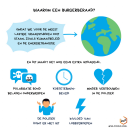
Begin dit jaar is het ‘Manifest Burgerberaad Klimaat en Milieu’ gelanceerd. Een coalitie van burgers en organisaties roept de politiek op een ambitieus burgerberaad in te stellen, waarin burgers maatregelen bedenken om de klimaatcrisis te bestrijden en biodiversiteitsverlies tegen te gaan. Ik ondersteun dit manifest van harte omdat ik erin geloof dat een grotere betrokkenheid van burgers bij deze grote uitdaging leidt tot betere en eerlijkere oplossingen. Jij ook? Teken het manifest!
De opwarming van de aarde raakt alles en iedereen. Om de aarde leefbaar te houden zijn snel grote veranderingen nodig. De Nederlandse overheid (gemeenten, provincies en Rijk) lijken nog onvoldoende in staat om tot een toereikende, integrale aanpak van de klimaatcrisis te komen. Een belangrijke barrière is dat moeilijke keuzes (bijvoorbeeld rondom de plaatsing van windmolens of het inperken van de intensieve landbouw) uit de weg worden gegaan. Ook worden burgers onvoldoende en vaak veel te laat betrokken bij de voorgestelde oplossingen, wat leidt tot vertraging en weerstand.
Waarom een burgerberaad?
Een burgerberaad is een onafhankelijk georganiseerde werkwijze waarbij een gelote dwarsdoorsnede van de Nederlandse bevolking zich laat informeren door experts en belanghebbenden. Vrij van lobby en verkiezingsdruk ontwikkelen zij maatregelen die eerlijk en toereikend zijn, en bovendien gesteund worden door de samenleving. Onder andere dit rapport van de OECD laat zien dat deze democratische methode in het buitenland goed werkt om hete hangijzers aan te pakken. Een belangrijke voorwaarde is dat het proces transparant wordt ingericht.
Smart City Amsterdam - Defining the future!
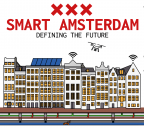
Dear AmsterdamSmartCity,
Today I start my dissertation project for Oxand. Together we will be working towards defining clearer goals for Gemeente Amsterdam's smart city objectives! We will approach this challenge by taking the #SmartCity principles and observing them through the lens of #SystemEngineering.
I am looking for members who are interesting in helping me identify stakeholders, current challenges facing the municipality, developing projects, objectives that must be fulfilled and much more!
Wat is jouw energielabel?
HvA-studenten Data Science voorspellen voor Vattenfall het energielabel voor gebouwen die dat nog niet hebben, om de energietransitie te versnellen.
Heeft jouw kantoorgebouw energielabel D? Dan is er werk aan de winkel. Om de klimaatdoelen uit het Parijsakkoord te halen en de opwarming van de aarde te beteugelen, moet de gebouwde omgeving versneld verduurzamen en vanaf 2023 minimaal energielabel C scoren. Een vernieuwd energielabel moet daarbij helpen. Maar wat als je dat nog niet hebt? HvA-studenten buigen zich voor partner Vattenfall tijdens een hackathon over de vraag: Kan voor gebouwen zonder energielabel een schatting voor een energielabel worden bepaald aan de hand van beschikbare data?
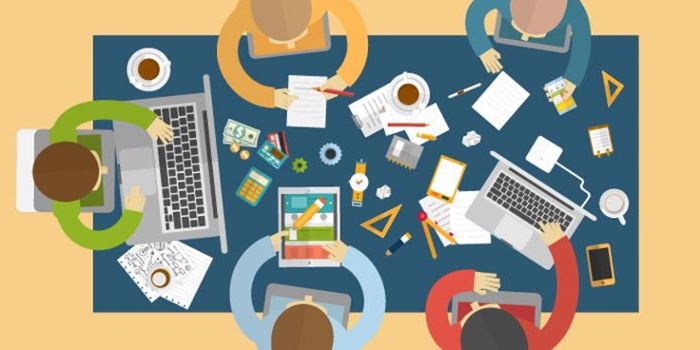
Na twee uur begaf de dataserver het al. Niet zo gek, er was haast en drukte: binnen een hackathon van een kleine week moesten de studenten van minor Data Science allemaal tegelijk de beschikbaar gestelde data over energieverbruik van Vattenfalls klanten analyseren. Met als doel: een zo accuraat mogelijk voorspelmodel voor de energielabels van gebouwen. Normaal ben je al weken lang bezig met datasets verkennen voordat je over kan gaan op opschonen, categoriseren, analyseren en voorspellen middels machine learning, stelt Rick Wolbertus, docent-onderzoeker Data Science van lectoraat Energie en innovatie. ‘Nu moesten ze dat in enkele dagen doen. Daarin zie je de kracht van een hackathon: binnen een bizar korte tijd krijg je verrassende uitkomsten; een groepje had een 84% accuraatscore in hun voorspelling voor energielabels, dat is echt knap.’
Energielabel bepalen
Van woningen tot fabriekshallen, het energielabel is een middel om de energie-efficiëntie van gebouwen te kwalificeren. Sinds begin dit jaar heeft het energielabel een metamorfose ondergaan, kent het andere kwalificeringseisen en is het bovendien verplicht geworden voor alle gebouwen. Met de nieuwe en vereenvoudigde bepalingsmethode (NTA 8800) wordt de energie-efficiëntie nu uitgedrukt in het energieverbruik per vierkante meter gebouwoppervlakte. Deze indicator is goed te vergelijken met werkelijk energieverbruik en moet beter inzicht geven in de energiezuinigheid van het gebouw. Daar kunnen maatregelen aan gekoppeld worden voor verduurzaming.
De hackathon voor energielabels is het eerste vraagstuk uit de praktijk voor studenten die voortkomt uit de tienjarige samenwerking tussen HvA Centre of Expertise Urban Technology en energieleverancier Vattenfall. De hackathon levert snel een frisse blik op, vertelt Tim Pellenkoft, data scientist bij Vattenfall. ‘De studenten, met verschillende achtergronden in onder andere journalistiek, technische bedrijfskunde en aviation, hebben andere denkbeelden die tot nieuwe inzichten leiden. Zo zagen zij patronen in bouwjaar, waar ik zelf nog niet op was gekomen. Oud bouwjaar? Vrijwel altijd een laag energielabel. Daar tegenover staan nieuwere gebouwen, die met een hoger label vaak beter zijn geïsoleerd.’
Het is aan de studenten om zulke variabelen, die invloed hebben op het energielabel, uit de data te halen. Daarin werden verrassende keuzes gemaakt, zag ook Wolbertus. ‘De data toonden enorme verschillen in verbruik tussen gebouwen van diverse industrieën. Industrieën die gigantische machines in hun gebouw gebruiken, die wil je scheiden van andere type bedrijven. Dus moet je categorieën maken en die in de voorspelling (middels machine learning-modellen) van elkaar scheiden. Zo voorkom je scheve analyses en kun je accurate verbanden leggen. Daar kwamen studenten zelf mee!’
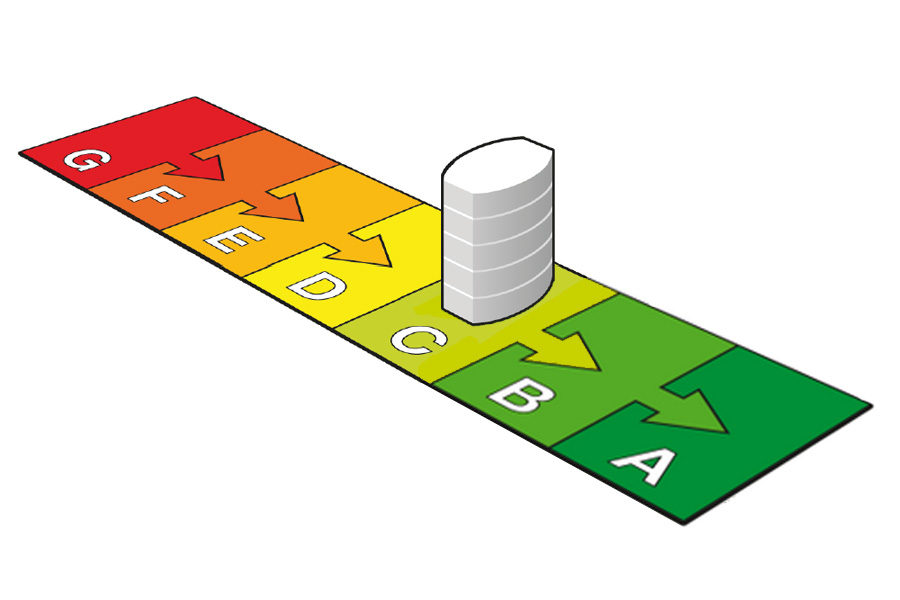
Inzicht in verbeterpotentieel voor gebouwen
De uitkomsten uit de analyses en voorspellingen van de studenten kunnen bijdragen aan een model dat energieleveranciers, gebouwbeheerders, bouw- en installatiebedrijven inzicht geeft in het verbeterpotentieel van het energieverbruik van gebouwen. Want om de klimaatdoelen van het Parijsakkoord te halen, staat de (bestaande) gebouwde omgeving nog voor een aantal uitdagingen: significante energiebesparing, zelf zoveel mogelijk energie opwekken, energie verbruiken op de momenten dat het duurzaam wordt opgewekt en het realiseren van alternatieven voor aardgas als bron van verwarming. Heb je dat op orde? Dan mag je rekenen op een ‘perfecte’ energielabel-score A+++.
Voor veel gebouwen is het nog niet zo ver. Daarom zijn data en voorspelmodellen nuttig, aldus Pellenkoft. ‘Die bieden periodiek inzicht voor onze klanten, zodat zij kunnen sturen om vanaf 2023 het verplichte energielabel C voor kantoorgebouwen te realiseren.’ En de studenten? Vattenfall gaat met vier studenten tien weken lang voortbouwen op de inzichten uit de hackathon, om tot een eindproduct te komen zoals een verbeterd voorspelmodel. Pellenkoft: ‘Zo kunnen zij meer leren over data science-projecten in de praktijk, en stomen we studenten heel gericht klaar voor werk na de studie.’
Meer informatie?
- Centre of Expertise Urban Technology
- Transitiethema Energy Transition
- Lectoraat Energie en innovatie
- Faculteit Techniek
- Energieleverancier Vattenfall
International Hackathon: Develop creative, innovative solutions for lower incomes in the energy transition
Are you a student with an interest in climate, technical and social innovations? Do you want to contribute to sustainable and affordable energy generation? Would you like to develop new concepts, products or services? Take part in the international hackathon Empower on Saturday 1 May! The hackathon offers a unique opportunity to collaborate with different students, experts and professionals. Your idea can have an impact on the social energy transition in Europe. You have a chance to win a sustainable grand prize!
Gezocht: (junior) Communicatie- en Programmamedewerker
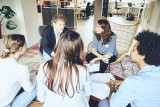
Wil jij je inzetten voor betere straten, buurten en steden? Ben jij thuis in de wereld van communicatie, social media en community management? En heb je affiniteit met stedelijke innovatie?
Kom dan het Amsterdam Smart City team versterken! Voor ons kernteam (bestaande uit 6 mensen) zijn wij op zoek naar een:
(junior) Communicatie- en programmamedewerker
Amsterdam Smart City is een onafhankelijk innovatieplatform dat innovatieve bedrijven, kennisinstellingen, overheden en proactieve bewoners samenbrengt en vorm geeft aan de stad van de toekomst.
Wij zijn ervan overtuigd dat de veranderingen die nodig zijn voor de vooruitgang van de stad en regio alleen gerealiseerd kunnen worden door samen te werken. Al onze activiteiten zijn daarom gericht op het faciliteren van ontmoeting, interactie en samenwerking, zodat partijen samen tastbare, duurzame innovaties tot stand kunnen brengen. Amsterdam Smart City richt zich met name op deze vier thema’s: mobiliteit, de digitale stad, energie en circulaire economie. Met het Amsterdam Smart City team zorgen we voor verbinding.
Wat ga je doen?
Je voert de communicatie- en communitystrategie actief uit door het maken van content, het schrijven van nieuwsbrieven, beheren van onze social media kanalen en het organiseren van events. Je bent veel in contact met de partners en andere organisaties binnen het netwerk van ASC.
Daarnaast werk je met onze partners aan het aanjagen van innovaties binnen het transitiepad Mobiliteit & Logistiek en legt verbindingen met de community. Ook breid je het netwerk uit met relevante organisaties en innovatieve projecten. De communicatie- en programmamedewerker werkt nauw samen met het gehele smart city team en legt verantwoording af aan de communicatiemanager. Daarnaast heb je een aantal programma ondersteunende taken.
Taken
• Je beheert onze social media kanalen, geeft inzage in de statistieken en onderneemt actie op basis van de data.
• Je onderhoudt het dagelijks contact met de leden van onze community op www.amsterdamsmartcity.com
• Je verzamelt, schrijft, redigeert en publiceert content voor de community en andere stakeholders.
• Je organiseert en draagt bij aan evenementen voor partners en ons bredere netwerk in de regio en communiceert hierover.
• Je coördineert, onder begeleiding, je eigen transitiepad: Mobiliteit & Logistiek en monitort voortgang van projecten en legt verbindingen.
• Je verbindt, mobiliseert en activeert partners en communityleden
• Je voert ondersteunende programma taken uit, zoals het vormgeven van presentaties en zorgdragen voor documentatie en het bijhouden van het CRM systeem.
Profiel:
• WO/HBO werk- en denkniveau
• Opleiding op gebied van communicatie of vergelijkbaar
• 1-2 jaar werkervaring
• Goede beheersing van Nederlands en Engels in woord en schrift
• Ervaring op het gebied van online communicatie, community management en/of projectondersteuning
• Affiniteit met innovatie en stedelijke ontwikkelingen, met het thema Mobiliteit & Logistiek in het bijzonder
• Type aanpakker, zelfstandig, communicatief sterk en flexibel.
• Gedreven in het creëren van maatschappelijke waarde
Wat bieden wij?
Wij bieden je een fijne werkplek op het Marineterrein in Amsterdam, met een informele en collegiale sfeer. Op dit moment werken we uiteraard veel thuis. We zijn een klein team (6 personen) waarin we nauw met elkaar samenwerken. We werken intensief samen met een grote groep gedreven mensen die zich inzetten voor een duurzame stad en regio, voor iedereen. Het is een regionale, nationale én internationale werkomgeving waarin je eigen inbreng en pro-activiteit zeer gewaardeerd worden.
We zoeken iemand voor 32-40 uur per week. Salarisindicatie o.b.v. 40 uur: €2.900 - €3.400 bruto excl vakantiegeld en eindejaarsuitkering. Wij bieden een jaarcontract met uitzicht op een vaste aanstelling.
Interesse gewekt?
Vind je dit goed klinken? Dan horen we graag van je! Stuur je CV en een korte motivatie voor 17 april naar: info@amsterdamsmartcity.com. De eerste gesprekken zijn op 20 en 21 april. Voor meer informatie over de functie kun bellen met Menouschka Plugge via 06-43752636.
Hopelijk spreken we elkaar snel!
Vacature: RVO zoekt Smart Cities adviseur
Wij zijn op zoek naar een optimist die gemotiveerd is om ‘Smart City ondernemerschap’ te bevorderen. Ons werk is door Corona veranderd, maar uiteindelijk draait het nog steeds – en steeds meer – om ondanks complexe processen te blijven streven naar vernieuwing en opschaling.
Reageren voor: 14 april 2021
Hoe kan digitalisering bijdragen aan een meer duurzame samenleving?
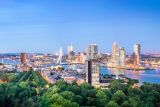
Onze leefomgeving is onlosmakelijk verbonden met de digitale wereld. Wilt u weten wat dat betekent voor meer duurzaamheid in de stad van de toekomst? Meldt u zich dan aan voor een webinar ‘Hoe kan digitalisering bijdragen aan een meer duurzame samenleving?’ op dinsdag 20 april.
Dit webinar wordt georganiseerd door de Raad voor de leefomgeving en infrastructuur (Rli), City Deal ‘Een slimme stad, zo doe je dat’ en de Future City Foundation.
Datum en tijd: 20 april, 9.30 – 10.30 uur
Locatie: Online
Deelname: Hier kunt u zich aanmelden. Deelname is gratis
Programma
9.30u Welkom en introductie
9.40u Pieter Hooimeijer over het advies van de Rli
9.50u Jan-Willem Wesselink over de City deal en hoe je een slimme stad bestuurt
10.00u Workshop over maatschappelijke veranderingen door digitalisering
10.15u In gesprek: wat is de rol van digitalisering in de duurzaamheidstransitie?
10.30u Afsluiting
In dit advies aan de overheid pleit de Rli ervoor om meer aandacht te hebben voor de veranderingen die digitalisering teweeg brengt in onze fysieke leefomgeving. In haar digitaliseringsbeleid moet de overheid duurzaamheid nadrukkelijker meenemen. Andersom moet het potentieel van digitale technologie beter worden benut voor de duurzaamheidstransities.
In de City deal worden concrete digitale en technologische tools ontwikkeld voor de slimme stad van de toekomst. Daarmee sluit de City deal aan bij het advies van de Rli aan de overheid voor een nieuwe denkwijze over digitalisering.
Sprekers
Prof. dr. Pieter Hooimeijer is voormalig lid van de Rli en voorzitter van de Rli-commissie die het advies voorbereidde. Hij zal de kern van het advies van de Rli toelichten. Jan-Willem Wesselink is hoofdredacteur van het boek ‘Zo bestuur je een slimme stad’ en programma manager van de City Deal ‘Een slimme stad, zo doe je dat’ en de Future City Foundation.
Stay up to date
Get notified about new updates, opportunities or events that match your interests.

